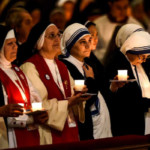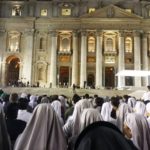Dehonians in Mozambique has lived synodality by standing by the people even during the tragedy of the war. Today synod means growing a ministerial church.
When the Dehonians arrived in Mozambique in 1947, they settled in Alto Molócuè, a northern area of the central province of Zambézia. Besides the 8 baptized, they had found there a diocesan priest from the Portuguese colonial regime and a women’s congregation. However, the seed of the gospel had already been sown in Mozambican soil in 1498 upon the arrival of Vasco de Gama along with his fellow travelers, including friars and chaplains trying to reach India. However, Vasco de Gama’s goal was not evangelization.
Although the colonizers were accompanied by missionaries, this was not for the salvation of souls, but yes, a matter of strategy to facilitate the realization of imperialist interests. This makes us understand the fact that being together (momentary quality), does not necessarily mean being together (proper quality). Anyway, that mass, held under a big tree on March 11, 1498, in St. George’s Island near Mozambique Island, according to historians, is considered the start of evangelization in Mozambique.
What have the Dehonians brought is new compared to the missionaries who preceded them? After 75 years of Dehonian presence in Mozambique, we no longer speak of figure 8 baptized in Alto Molócuè. That goes to the historical archives. We now talk about much more, either in terms of numbers or impact in the social and religious sphere at the national level. Dehonians have always been known as friends of the people. Their simple lifestyle, their closeness to the poor, their commitment to work, and in short, their gratuitousness, have inspired an entire society.
Since they arrived in Mozambique, the priority of their mission has not only been to do catechesis and administer the sacraments. Dehonians have chosen to do the Missio ad Gentes in its literal sense as our founder had done among the needy of his time. It is not enough just to accompany people living their stories (being together), we need to make people’s stories as our story (being together). This implies not only being aware of current events and mutations but above all making the effort to find appropriate solutions for each situation.
Their apostolate par excellence was that of closeness to the people, not only to share the faith of the Risen One but also in every event of daily life. In this way, the people took out of their heads the idea of compulsive subordination set by the colonial regime, replacing it with a sense of belonging where everyone feels like an actor in a common path.
In this sense, Dehonians have offered the church in Mozambique a particularly synodal (being together) heritage. One of the fruits of this heritage is the ministerial church.
Mozambique experienced sixteen years of civil war after independence. Dehonians shared this experience of pain and terror but never withdrew from carrying out the mission entrusted by Jesus. Dehonians have shown themselves to be true shepherds following the example of Christ. Despite the dangers of war, they never abandoned the people entrusted to them. Christian communities never lacked gatherings to share the Eucharistic bread and the joy of walking together.
Because missionaries were few in number and could not assist all Christian places and communities, they entrusted certain tasks, such as catechesis and the administration of baptism, to extraordinary ministers. These were also responsible for bringing holy communion to others. In this way, the ministerial Church was born, in which each member of the Christian community feels that he or she is a participant in the mission of the Church and not a mere “consumer.”




